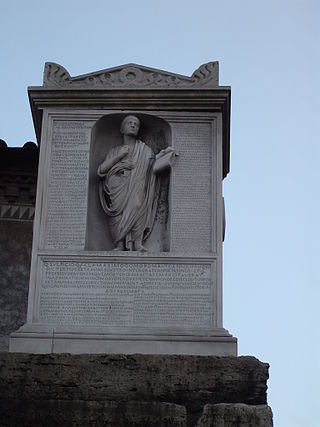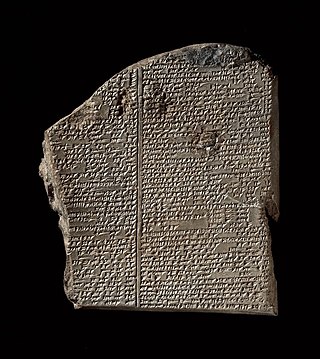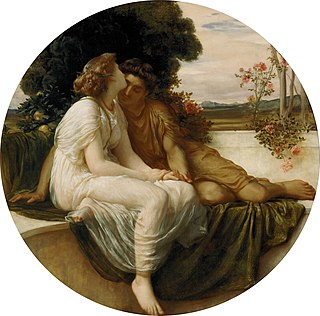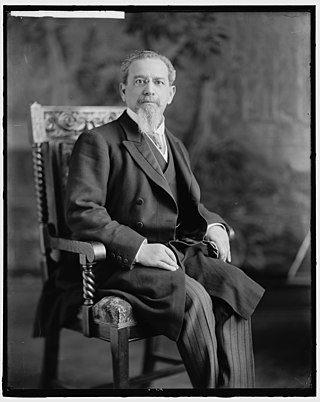Related Research Articles

Gaius Valerius Catullus, often referred to simply as Catullus, was a Latin poet of the late Roman Republic who wrote chiefly in the neoteric style of poetry, focusing on personal life rather than classical heroes. His surviving works are still read widely and continue to influence poetry and other forms of art.
Dactylic hexameter is a form of meter or rhythmic scheme frequently used in Ancient Greek and Latin poetry. The scheme of the hexameter is usually as follows :
The elegiac couplet is a poetic form used by Greek lyric poets for a variety of themes usually of smaller scale than the epic. Roman poets, particularly Catullus, Propertius, Tibullus, and Ovid, adopted the same form in Latin many years later. As with the English heroic couplet, each pair of lines usually makes sense on its own, while forming part of a larger work.

An epigram is a brief, interesting, memorable, sometimes surprising or satirical statement. The word derives from the Greek ἐπίγραμμα. This literary device has been practiced for over two millennia.

Poetry, also called verse, is a form of literature that uses aesthetic and often rhythmic qualities of language − such as phonaesthetics, sound symbolism, and metre − to evoke meanings in addition to, or in place of, a prosaic ostensible meaning. A poem is a literary composition, written by a poet, using this principle.

Cornelius Nepos was a Roman biographer. He was born at Hostilia, a village in Cisalpine Gaul not far from Verona.
The adjective elegiac has two possible meanings. First, it can refer to something of, relating to, or involving, an elegy or something that expresses similar mournfulness or sorrow. Second, it can refer more specifically to poetry composed in the form of elegiac couplets.

The history of Latin poetry can be understood as the adaptation of Greek models. The verse comedies of Plautus, the earliest surviving examples of Latin literature, are estimated to have been composed around 205-184 BC.
Ibis is a curse poem by the Roman poet Ovid, written during his years in exile across the Black Sea for an offense against Augustus. It is "a stream of violent but extremely learned abuse," modeled on a lost poem of the same title by the Greek Alexandrian poet Callimachus.
A catalectic line is a metrically incomplete line of verse, lacking a syllable at the end or ending with an incomplete foot. One form of catalexis is headlessness, where the unstressed syllable is dropped from the beginning of the line.
Invective is abusive, reproachful, or venomous language used to express blame or censure; or, a form of rude expression or discourse intended to offend or hurt; vituperation, or deeply seated ill will, vitriol. The Latin adjective invectivus means 'scolding.'

Poetry as an oral art form likely predates written text. The earliest poetry is believed to have been recited or sung, employed as a way of remembering oral history, genealogy, and law. Poetry is often closely related to musical traditions, and the earliest poetry exists in the form of hymns, and other types of song such as chants. As such, poetry is often a verbal art. Many of the poems surviving from the ancient world are recorded prayers, or stories about religious subject matter, but they also include historical accounts, instructions for everyday activities, love songs, and fiction.

The poetry of Gaius Valerius Catullus was written towards the end of the Roman Republic. It describes the lifestyle of the poet and his friends, as well as, most famously, his love for the woman he calls Lesbia.

In classical studies the term epyllion refers to a comparatively short narrative poem that shows formal affinities with epic, but betrays a preoccupation with themes and poetic techniques that are not generally or, at least, primarily characteristic of epic proper.

Joaquín Demetrio Casasús, a Mexican economist, lawyer, banker, politician, diplomat and writer who served on two occasions as Ambassador of Mexico to the United States.
The ionic is a four-syllable metrical unit (metron) of light-light-heavy-heavy that occurs in ancient Greek and Latin poetry. According to Hephaestion it was known as the Ionicos because it was used by the Ionians of Asia Minor; and it was also known as the Persicos and was associated with Persian poetry. Like the choriamb, in Greek quantitative verse the ionic never appears in passages meant to be spoken rather than sung. "Ionics" may refer inclusively to poetry composed of the various metrical units of the same total quantitative length that may be used in combination with ionics proper: ionics, choriambs, and anaclasis. Equivalent forms exist in English poetry and in classical Persian poetry.

Iambus or iambic poetry was a genre of ancient Greek poetry that included but was not restricted to the iambic meter and whose origins modern scholars have traced to the cults of Demeter and Dionysus. The genre featured insulting and obscene language and sometimes it is referred to as "blame poetry". For Alexandrian editors, however, iambus signified any poetry of an informal kind that was intended to entertain, and it seems to have been performed on similar occasions as elegy even though lacking elegy's decorum. The Archaic Greek poets Archilochus, Semonides and Hipponax were among the most famous of its early exponents. The Alexandrian poet Callimachus composed "iambic" poems against contemporary scholars, which were collected in an edition of about a thousand lines, of which fragments of thirteen poems survive. He in turn influenced Roman poets such as Catullus, who composed satirical epigrams that popularized Hipponax's choliamb. Horace's Epodes on the other hand were mainly imitations of Archilochus and, as with the Greek poet, his invectives took the forms both of private revenge and denunciation of social offenders.
Latin prosody is the study of Latin poetry and its laws of meter. The following article provides an overview of those laws as practised by Latin poets in the late Roman Republic and early Roman Empire, with verses by Catullus, Horace, Virgil and Ovid as models. Except for the early Saturnian poetry, which may have been accentual, Latin poets borrowed all their verse forms from the Greeks, despite significant differences between the two languages.
References
- ↑ Gamo, J.M.A. (2004). Cayo Valerio Catulo: poesías completas. Cayo Valerio Catulo: poesías completas (in Spanish). Ed. Aache. p. 168. ISBN 978-84-96236-15-8 . Retrieved 2022-04-27.